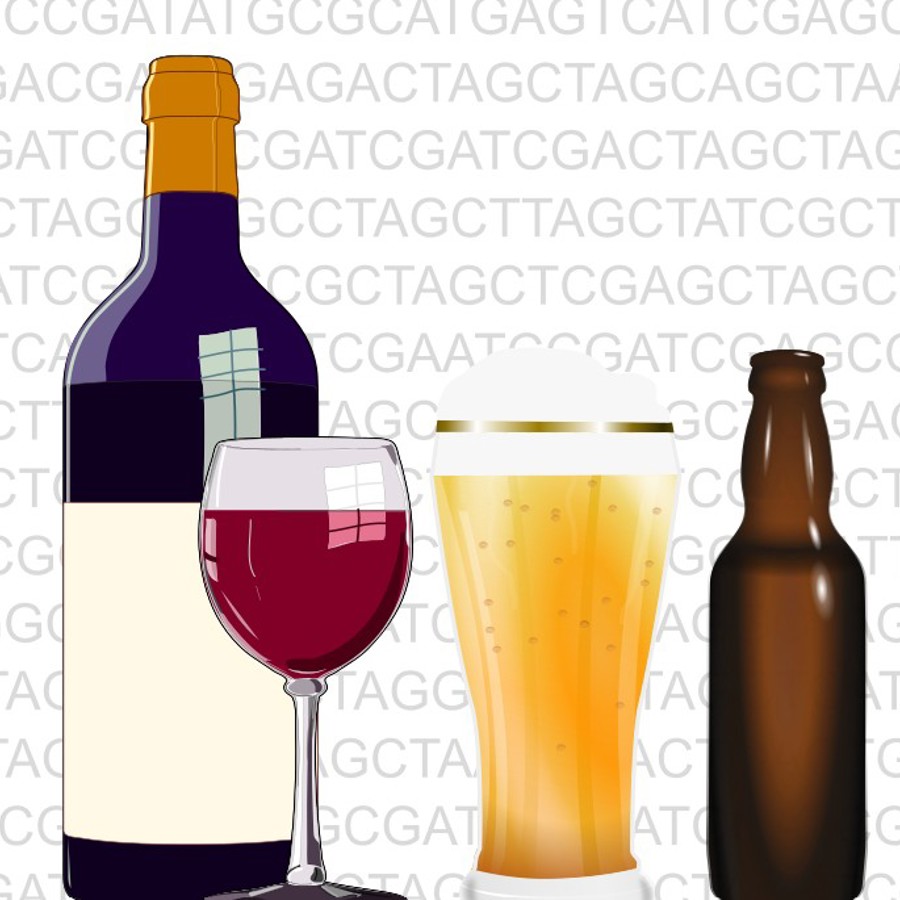
Is there a genetic test for alcoholism?
August 4, 2009

- Related Topics:
- Complex traits,
- Environmental influence,
- Genetic testing
A curious adult from California asks:
"Is there a medical procedure/test that a person can take to determine if there is a genetic pre-disposition to alcohol addiction or to the disease of alcoholism?"
Alcoholism definitely seems to run in families. And the evidence points to at least part of that being due to genes. But there isn't a genetic test yet for the risk of being an alcoholic.
This isn't surprising since alcoholism is so complicated. All the data so far points to lots of genes being involved. And to a person's environment playing a big part too. So this wouldn't be like the simple genetic test for sickle cell anemia, which is caused by a known difference in a single gene and so is easily tested. Alcoholism is more like diabetes or late onset Alzheimer's. These diseases are the result of lots of different genes and the environment working together. That's not so easy to test!
In the future we may be able to do tests for more complicated diseases like these. We're just not there right now.
Which genes are involved in alcoholism?
So far, scientists have found differences in about a dozen genes that can affect your chances of becoming an alcoholic, and they seem to contribute to about half your risk.1
These genes can influence a lot of different traits. For example, the genes that contain instructions for making alcohol dehydrogenase (ADH) and acetaldehyde dehydrogenase (ALDH) play a role in turning alcohol, which is toxic, into acetate, which is safe. During this process, acetaldehyde is made, and if this acetaldehyde is not converted into acetate, it can make someone really sick. If someone has versions of ADH and ALDH genes that result in higher levels of acetaldehyde, then they are less likely to drink a lot since they will feel really sick. On the flip side, if someone has versions of these genes that greatly limit the amount of acetaldehyde that gets made, they may drink a lot more since they won’t feel as sick.2

Differences in another gene, TAS2R16 (catchy, huh?), actually control how bitter alcohol tastes. One version of this gene makes alcohol and some other foods taste bitter and the other version doesn't. If you are born with the bitter tasting version, then you are less likely to become an alcoholic because alcohol tastes nasty to you.3
Differences in yet more genes might affect how alcohol impacts your mood, or how much you need to drink in order to feel the effects of alcohol.4 An important point here is that people don't have separate alcoholism genes. What they have are differences in certain genes that can increase their risk of developing alcoholism.
A genetic test for alcoholism would have to look at many different genes that all contribute to risk in complicated ways. A genetic counselor would then tally how many of each version you have and figure out your genetic risk. Which of course, is only half the story.
The Environment Plays an Important Role
Many different genes may contribute to alcoholism. But genes aren't the only causes of the disease. If half of the risk for alcoholism comes from your genes, then the other half must be caused by something else.
That "something else" is your environment. Just like there are many different genes that play a role in shaping how much someone drinks, there are many different environmental factors that shape drinking. How available alcohol is, how old a person is when they start drinking, and how much peers drink all contribute to someone’s risk of alcoholism.5,6

Typically, your genes and the environment work together to shape your risk. Imagine someone has versions of the ADH genes and ALDH2*1 that allow them to drink lots of alcohol without getting sick. If they live in a place where alcohol is readily available, their risk is going to be a lot higher than if they live somewhere without a lot of access. Their risk will be even higher if they start drinking alcohol from a young age or if heavy drinking is normalized among their family or peers. As you can see, your genes and the environment both play important roles in alcoholism.
Because alcoholism is so complicated, scientists haven't come up with a good genetic test for it yet. But they are still working on the problem. In the future, we may be able to use genetics to predict someone’s risk for developing alcoholism. However, it will be important to remember that the environment plays a huge role, so these tests won’t be able to account for everything.

Author: Stacey Wirt
When this answer was published in 2009, Stacey was a Ph.D. candidate in the Department of Cancer Biology, studying regulation of cell cycle and differentiation in embryonic stem cells in Julien Sage's laboratory. Stacey wrote this answer while participating in the Stanford at The Tech program.
 Skip Navigation
Skip Navigation
